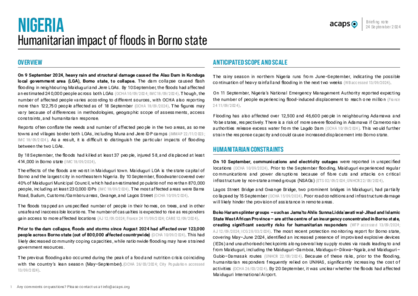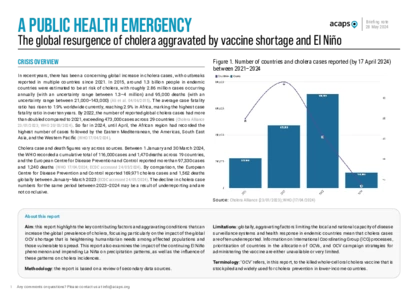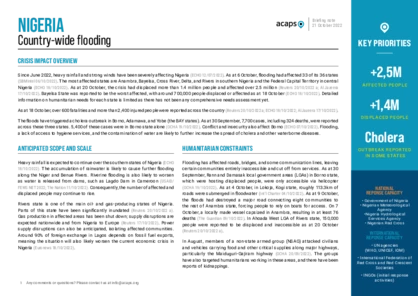Latest updates on country situation
15 April 2025
At least 51 people were killed in the early hours of Monday, 14 April 2025, in Zikke and Kimakpa villages in Bassa district, Plateau state, Nigeria. The gunmen, suspected to be cattle herders, launched the attack while residents were asleep, leaving several others injured. The incident follows a series of deadly attacks in Plateau, including one in the previous week that left 52 dead and displaced nearly 2,000 people across affected communities. The needs of those affected remain unknown. (Reuters 14/04/2025, AP 15/04/2025, HumAngle 14/04/2025)
20 March 2025
The USAID funding freeze enacted in early 2025 has significantly contributed to severe funding gaps for humanitarian response programmes in Adamawa, Borno, and Yobe states, causing cascading failures across critical sectors: healthcare systems struggle with medicine and staff shortages, hampering the cholera and measles outbreak response; nutrition programmes have reduced coverage, increasing risks for children with severe acute malnutrition; and shelter, NFI, and camp coordination and management services face delays or suspensions, leaving displaced people without basic protection. A mid-February survey assessing the impact of the funding freeze on implementing responders confirmed these service gaps, documenting severe operational disruptions across Borno state as organisations scaled down critical services. With reduced capacity among humanitarian responders and no immediate alternatives to fill the void, overstretched response systems are failing to meet basic needs, leaving vulnerable communities with rapidly deteriorating access to lifesaving aid. (CCCM Cluster et al. 16/03/2025, OCHA 12/03/2025, BBC 18/03/2025)
21 January 2025
The northwest of Nigeria continues to face high levels of humanitarian needs caused by long-standing ethnic and religious tensions and banditry, often leading to violence against civilians. On 8 January, armed groups carried out multiple attacks in Zamfara State, killing five people and abducting over 200, primarily women and children. This incident followed a similar attack in Gana town on 5 January, where 46 individuals were kidnapped. By June 2024, over 670,000 people were displaced across, Kaduna, Katsina, Sokoto, and Zamfara states.
Insecurity in Zamfara has severely disrupted access to essential healthcare services, leaving communities without basic medical care. Frequent attacks by armed groups have forced the closure of some health facilities, while others operate at reduced capacity because of staff shortages and security concerns. Access to healthcare facilities remains a significant challenge, particularly for women seeking maternal services, as the fear of attacks and the remoteness of certain areas hinder their ability to receive timely and essential care. Many residents face difficulties accessing vaccinations for preventable diseases, further intensifying public health risks.
(ECHO 10/01/2025, [IOM 18/04/2024] (https://dtm.iom.int/reports/nigeria-north-central-and-north-west-round-14-idp-atlas-june-2024), MSF 16/01/2025)
22 October 2024
In North West Nigeria, particularly in Kaduna, Katsina, and Zamfara states, banditry has severely disrupted healthcare and education services. Health workers face abductions, the looting of medical supplies, and the destruction or seizure of healthcare facilities. Insecurity has also led to the closure of numerous health centres, especially in local government areas such as Maru, Shinkafi, and Zurmi, requiring residents to travel long distances to state capitals or neighbouring states for medical care. Bandits have taken over over 168 schools in Zamfara, and their attacks have displaced nearly 700,000 people and disrupted agricultural activities, leading to worsening food insecurity. As a result, 13.5 million people face acute food shortages, with 460,000 experiencing Emergency (IPC Phase 4) food insecurity levels. (ACSS 21/10/2024, HumAngle 03/02/2024)
15 October 2024
Since July 2024, floods in Nigeria have inundated 31 of the 36 states in the country and affected 1.2 million people. The most affected state is Borno state, with around 420,000 affected people. The floods have damaged or destroyed around 117,000 houses and affected around 180,000 cultivated farmlands. At least 50,000 displaced people are still residing in emergency shelters. Urgent humanitarian needs include food, potable water, shelter, NFIs (such as mosquito nets, mats, and hygiene kits), access to WASH services, healthcare support, and protection services, especially for women, children, and people with disabilities. (OCHA 15/10/2024)
12 September 2024
On 10 September 2024, severe flash flooding in Maiduguri city triggered the collapse of the Alau Dam, affecting over 239,000 people and displacing nearly 50,000 across Bulabulin, Fori, Galtimari, and Gwange areas (Borno state). The flooding has disrupted critical supply chains and hindered access to schools, healthcare facilities, and markets in many parts of Borno. Immediate needs for the affected include food, NFIs, shelter, and clean water. (OCHA 10/09/2024, ECHO 11/09/2024, CNN 11/09/2024)
03 September 2024
By 2 September 2024, heavy rains had affected over 500,000 people across 28 of Nigeria’s 36 states, including Bauchi, Jigawa, Niger, Sokoto, and Zamfara. The floods have displaced 205,000 people, killed 170, damaged 76,000 houses, and destroyed over 106,089 hectares of farmland. (IRC 02/09/2024, VOA 28/08/2024)
current crises
in
Nigeria
These crises have been identified through the INFORM Severity Index, a tool for measuring and comparing the severity of humanitarian crises globally.
NGA001 - Complex crisis
Last updated 25/03/2025
Drivers
Conflict
Displacement
Violence
Floods
Crisis level
Country
Severity level
4.1 Very High
Access constraints
4.0
NGA004 - Lake Chad basin crisis
Last updated 25/03/2025
Drivers
Conflict
Displacement
Crisis level
Country
Severity level
4.2 Very High
Access constraints
5.0
NGA007 - Northwest Banditry
Last updated 25/03/2025
Drivers
Violence
Displacement
Crisis level
Country
Severity level
3.5 High
Access constraints
3.0
NGA008 - Cameroonian Refugees
Last updated 25/03/2025
Drivers
Displacement
Crisis level
Country
Severity level
2.1 Medium
Access constraints
2.0
Analysis products
on
Nigeria
24 September 2024
Nigeria: humanitarian impact of floods in Borno state
DOCUMENT / PDF / 743 KB
On 9 September 2024, heavy rain and structural damage caused the Alau Dam in Konduga local government area (LGA), Borno state, to collapse. The dam collapse caused flash flooding in neighbouring Maiduguri and Jere LGAs.
28 May 2024
Global increase of cholera: aggravated by vaccine shortage and El Niño
DOCUMENT / PDF / 341 KB
This report highlights the key contributing factors and aggravating conditions that can increase the global prevalence of cholera, focusing particularly on the impact of the global OCV shortage that is heightening humanitarian needs among affected populations and those vulnerable to spread.
Attached resources
03 January 2024
Nigeria: conflict in the northeast and northwest
DOCUMENT / PDF / 201 KB
Violent incidents reported include attacks, kidnapping, and extortion by non-state armed groups (NSAGs), such as Boko Haram and the Islamic State – West Africa Province (ISWAP), as well as militias known locally as bandits.
21 October 2022
Nigeria: country-wide flooding
DOCUMENT / PDF / 1 MB
Since June 2022, heavy rainfall and strong winds have been severely affecting Nigeria. As at 6 October, flooding had affected 33 of its 36 states. As at 20 October, the crisis had displaced more than 1.4 million people and affected over 2.5 million. The floods have triggered a cholera outbreak in Borno, Adamawa, and Yobe.
17 August 2022
Lake Chad Basin: Impact of extreme weather & climate events on food security
DOCUMENT / PDF / 1 MB
This report aims to explore the impact of extreme weather and climate events on the humanitarian situation in the Lake Chad Basin. Since the 1970s in West and Central Africa, river floods and agricultural and ecological droughts have been increasing while average rainfall has been decreasing. These phenomena have an impact on availability of resources and land, and consequently on the economic and living conditions of the regions’ populations.






